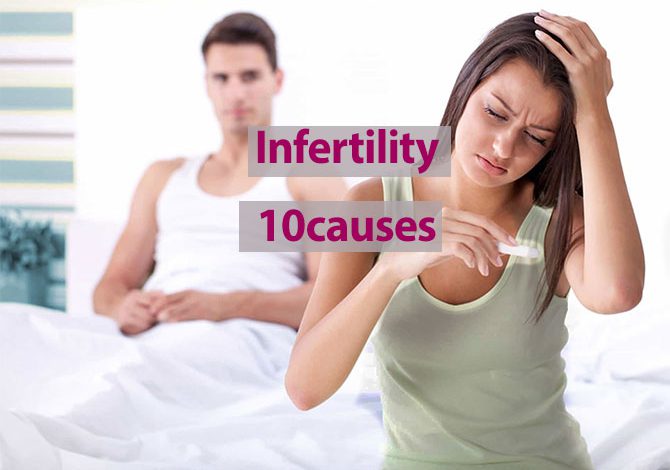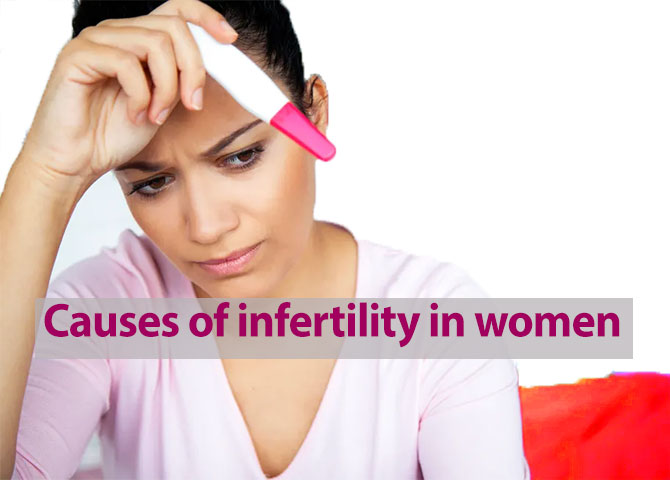Get to know the 10 main causes of infertility in women

Infertility in couples may have several reasons. Therefore, it is not possible to comment on it without conducting specialized tests. Infertility in women and infertility in men can have different reasons.
What is infertility?
Trying to conceive is an exciting experience for many couples. However, when months pass and pregnancy tests show negative results, the exciting process of trying to get pregnant can turn into a stressful and uncomfortable process.
Because couples usually lose hope and think that they are infertile. But first of all, it is better to consult a gynecologist in this field.
When can you say that a couple is really infertile?
When a woman tries to get pregnant regularly for 12 months without any prevention and pregnancy does not occur, it can be said that the couple is involved in infertility.
Of course, this time is 6 months for women over 35 years old. In addition, women who were pregnant in the past but are now unable to conceive, and women who have frequent miscarriages, are also considered infertile.
But the thing is, infertility does not only affect women. Men can also struggle with infertility problems. Therefore, both couples should be examined and tested.
Related posts: What are the types of pregnancy bleeding and the reason for pregnancy bleeding?
Causes of infertility in women
Infertility in women has various causes. In the following, the most common causes of infertility in women are examined.
1) Age
As a woman ages, the number of eggs and as a result her fertility decreases rapidly. This decline becomes more pronounced in the mid-30s. It is estimated that about one-third of couples in which the woman is over 35 years old are involved in infertility.
In addition, as a woman’s age increases, the quality of her eggs also decreases. In addition to reducing fertility, this problem also increases the possibility of chromosomal abnormalities. Studies have shown that approximately 70% of miscarriages occur due to chromosomal abnormalities.
2) Ovulation disorders
Ovulation disorders typically affect a woman’s ability to conceive naturally. Because without successful ovulation, there is no egg for fertilization to occur.
Ovulation disorders mean that ovulation rarely occurs in a woman’s body or that the woman does not ovulate at all. Ovulation disorders are very common and cause infertility in about 1 out of every 4 infertile couples.

Polycystic ovary syndrome (PCOS) is one of the most common disorders affecting ovulation. Other causes of ovulation disorders include hormonal disorders such as hypothyroidism, ovarian failure, hypothalamus dysfunction, etc.
3) Polycystic ovary syndrome
Ovulation is often caused by polycystic ovary syndrome (PCOS), popularly known as ovarian laziness.
This syndrome is the most common cause of infertility in women. Polycystic ovary syndrome is associated with irregular periods, insulin resistance, abnormal growth of facial or body hair, obesity, and acne. The severity and number of these symptoms are different for each woman.
4) Premature ovarian failure
This disorder is also known as primary ovulatory failure. This condition is characterized by an autoimmune response or early loss of egg storage. The cause of this can be family genetics or chemotherapy.
5) Hormonal disorders
Fluctuation in the level of hormones due to various reasons can affect the menstrual cycle, ovulation, and consequently the fertility of a woman. Among the most common causes of hormonal disorders, the following can be mentioned:
- Hypothalamic dysfunction: Its most common symptom is irregular menstruation or non-occurrence of menstruation. Dysfunction of the hypothalamus in women leads to a disturbance in the level of gonadotropin hormones, followed by pituitary hormones LH and FSH, and as a result, ovulation and fertility are affected.
- Pituitary dysfunction: If there is a defect in the production of hormones secreted from the
- pituitary gland (LH and FSH), ovulation will be difficult.
- Thyroid gland dysfunction
- Increased levels of the hormone prolactin
6) Disorders related to fallopian tubes
The fallopian tubes or uterine tubes of a woman, which are located between the ovaries and the uterus, may be damaged for various reasons, from surgery to sexually transmitted infections (STIs).
Abnormality or damage to these tubes can prevent the sperm from reaching the egg, or even if fertilization occurs, it may prevent the fertilized egg from passing to the uterus.
7) Endometriosis
Endometriosis affects women’s ability to conceive naturally. This disease, which affects about 10% of women of reproductive age, occurs when the tissue that normally grows inside the uterus grows in other places of the body and outside the uterus.
8) Abnormalities and uterine lesions
Abnormalities and structural lesions of the uterus are important factors affecting a woman’s fertility. Among them, the following can be mentioned:
- Unicorn or bicorn uterus
- Double uterus
- The uterus has a septum
- Arched uterus
- Uterine polyps
- fibroids (myomas)
9) Infertility without reason
Sometimes, the cause of infertility cannot be explained and the cause cannot be found. This means that the doctors have not found a clear reason for infertility and the tests performed all show normal results.
For many couples, this can be uncomfortable and they don’t know what the next steps are going to be for them. Although having unexplained infertility can be confusing and frustrating, fortunately, even when the cause of infertility is unknown, various fertility treatments can eventually lead couples to have children.
10) Lifestyle
In many cases, the main cause of infertility in women is their lifestyle. In the following, we examine some of the most important reasons that cause infertility in women:
- Use of tobacco or alcohol: In addition to reducing fertility, these substances also have a negative effect on the effectiveness of infertility treatments. In addition, the rate of abortion and ectopic pregnancy is higher in women who smoke.
- A poor diet that lacks nutrients.
- Excessive exposure to certain chemicals and toxic substances.
Infertility is a common and often distressing condition that affects many women around the world. According to research, the main causes of infertility in women are related to issues with ovulation, fallopian tubes, and uterus. Ovulation disorders can prevent the ovaries from releasing mature eggs, which is necessary for fertilization to occur. Fallopian tube problems can also hinder the fertilization process by preventing the sperm from reaching the egg, or by impeding the fertilized egg’s journey to the uterus. Uterine issues such as fibroids or polyps can also affect fertility by disrupting implantation or development of the embryo. Age, hormonal imbalances, and lifestyle factors can also contribute to female infertility. It is important for women to understand the potential causes of infertility and seek medical advice in order to explore all available options for treatment and improve their chances of achieving a successful pregnancy.
What are the main causes of infertility?
What are the two main causes of female infertility?
What are the types of female infertility?
How common is infertility in females?
indicates that the most common cause of infertility in women is related to ovulation disorders, followed by issues with the fallopian tubes and uterus. Other factors such as age, hormonal imbalances, and lifestyle choices also play a significant role in female infertility.
It is important for women who are struggling with infertility to seek medical advice and support in order to explore all available treatment options and increase their chances of achieving a successful pregnancy.
